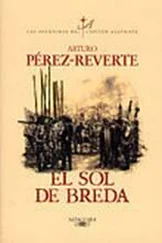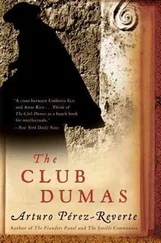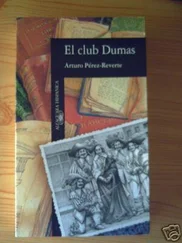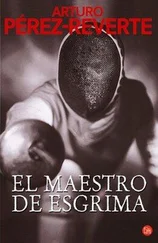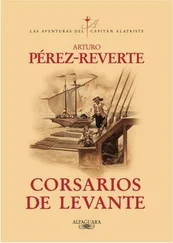“All right, my friend, all right . . .”
“No, Devil take it, it’s not all right. Not even a Lutheran could come up with a worse insult. What have I to do with poetasters and versifiers like him who, in one bound, go from being Jews or Moors to playing at being shepherds?”
“It was only a joke.”
“I’ve had duels before now over jokes like that, Count.”
“Well, don’t even consider such a possibility with me,” said the count, smiling, conciliatory and good-natured, stroking his curled mustache and his goatee. “I still remember the fencing lesson you gave to Pacheco de Narváez.” He gracefully raised his right hand and very politely doffed an imaginary hat. “My apologies, don Francisco.”
“Hm.”
“What do you mean, ‘Hm’? I’m a grandee of Spain, damn it! At least be so kind as to acknowledge my gesture.”
“Hm.”
Once the poet’s wounded feelings had, despite all, been soothed, Guadalmedina continued to provide more details, to which Captain Alatriste listened intently, his mug of wine in his hand, and his reddish profile half lit by the flames of the candles on the table. War is at least clean, he had said once, some time ago. And at that moment, I understood precisely what he meant. Foreigners, Guadalmedina was saying, get around the monopoly by using local intermediaries and third parties—they were called “dodgers,” a word that said it all—thus diverting the merchandise, the gold and the silver, which they would never have been able to obtain directly. More to the point, the idea that the galleons left Seville and returned there was a legal fiction; they almost always remained moored in Cádiz, in El Puerto de Santa María or Barra de Sanlúcar, where the cargo was loaded onto another ship. This encouraged many merchants to move into that area, where it was easier to elude the guards.
“They’ve even built ships with an official declared tonnage but whose real tonnage is quite different. Everyone knows that while they happily own up to carrying five tons, in fact they can carry ten. Bribery and corruption, however, keep people’s mouths shut and their willingness to cooperate open. A great many people have made their fortune that way.” He studied the bowl of his pipe, as if its contents merited his particular attention. “And that includes certain high royal officials.”
Guadalmedina continued his account. Made lethargic by the benefits of overseas trade, Seville, like the rest of Spain, had become incapable of sustaining any industry of its own. Many people from other lands had managed to set up businesses there, and thanks to hard work and tenacity, had made themselves indispensable. This put them in a privileged position as intermediaries between Spain and the parts of Europe with which we were at war. The paradox was that while we were locked in battle with England, France, and Denmark, as well as with the Turk and the rebel provinces, we were, at the same time, through those intermediaries, buying all kinds of merchandise from them: rigging, tar, sails, and other goods that were essential both in the Peninsula and across the Atlantic. Thus the gold from the Indies slipped away to finance the armies and navies that were fighting us. It was an open secret, but no one put a stop to this traffic because everyone was profiting from it. Including the king.
“The result is obvious: Spain is going to the dogs. Everyone steals, cheats, and lies and no one pays his debts.”
“They even boast about it,” added Quevedo.
“They do.”
The smuggling of gold and silver, Guadalmedina went on, was crucial to this state of affairs. With the frequent connivance of customs officers and officials at the Casa de Contratación, only half the real value of any treasure imported by individuals was declared. Each fleet brought with it a fortune that disappeared into private pockets or ended up in London, Amsterdam, Paris, or Genoa. This smuggling was enthusiastically embraced by foreigners and Spaniards alike, by merchants, government officials, captains of fleets, admirals, passengers, sailors, soldiers, and clerics. An example of the last was the scandal surrounding Bishop Pérez de Espinosa, who, when he died in Seville a couple of years earlier, had left five hundred thousand reales and sixty-two gold ingots, which were immediately seized by the Crown when it was discovered that all this wealth had come from the Indies without having passed through customs.
“It’s estimated,” Guadalmedina went on, “that, taking into account the king’s treasure and that brought by private individuals, the treasure fleet which is about to arrive is carrying—along with sundry other merchandise—twenty million silver reales from Zacatecas and Potosí, as well as eighty quintals of gold in bars.”
“And that’s only the official amount,” said Quevedo.
“Exactly. They reckon that, of the silver, a quarter more is arriving as contraband. As for the gold, it almost all belongs to the Royal Treasury, but one of the galleons is carrying a secret cargo of ingots, a cargo no one has declared.”
The count paused and took a long drink so as to allow Captain Alatriste to absorb these facts. Quevedo had taken out a small box containing powdered tobacco. He took a pinch and, after sneezing discreetly, wiped his nose on the crumpled handkerchief he kept up his sleeve.
“The ship is called the Virgen de Regla, ” Guadalmedina continued at last. “It’s a sixteen-cannon galleon, the property of the Duque de Medina Sidonia, and hired by a Genoese merchant based in Seville called Jerónimo Garaffa. On the voyage out, it transports a variety of goods, from Almadén mercury for the silver mines to papal bulls, and on the return voyage it carries everything and anything it can. And it can carry a great deal, because while its official capacity is nine hundred barrels of twenty-seven arrobas each, in reality it has been so built that its actual capacity is one thousand four hundred barrels.”
The Virgen de Regla, he went on, was traveling with the treasure fleet, and its declared cargo included liquid amber, cochineal, wool, and skins intended for the merchants of Cádiz and Seville. There were also five million silver reales —two-thirds of which were the property of private individuals—and one thousand five hundred gold ingots destined for the Royal Treasury.
“A fine booty for pirates,” commented Quevedo.
“Especially when you consider that this year’s fleet comprises another four ships with similar cargo.” Guadalmedina studied the captain through his pipe smoke. “Now do you understand why the English were so interested in Cádiz?”
“And how did the English know?”
“Damn it, Alatriste. We know, don’t we? If you can buy the salvation of your soul with money, imagine what else you can buy. You seem a touch ingenuous tonight. Where have you spent the last few years? In Flanders or in Limbo?”
Alatriste poured himself more wine and said nothing. His eyes rested on Quevedo, who gave a faint smile and shrugged. That’s the way it is, said the gesture. And always has been.
“At any rate,” Guadalmedina was saying, “it doesn’t much matter what they claim the official cargo to be. We know that the galleon is carrying contraband silver too, at an estimated value of one million reales. The silver, however, is the least of it. The Virgen de Regla is carrying in its hold another two thousand gold bars—undeclared.” The count pointed with the stem of his pipe at the captain. “Do you know how much that secret cargo is worth, at the very lowest estimate?”
“I haven’t the slightest idea.”
“Well, it’s worth two hundred thousand gold escudos.”
The captain was studying his hands, which lay motionless on the table. He was silently calculating.
Читать дальше

